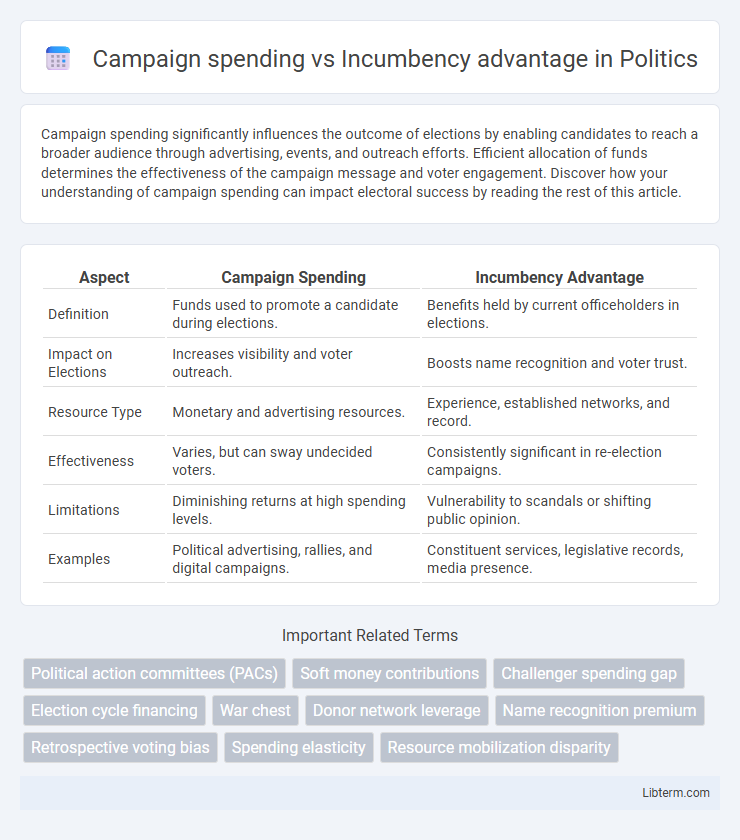Campaign spending significantly influences the outcome of elections by enabling candidates to reach a broader audience through advertising, events, and outreach efforts. Efficient allocation of funds determines the effectiveness of the campaign message and voter engagement. Discover how your understanding of campaign spending can impact electoral success by reading the rest of this article.
Table of Comparison
| Aspect | Campaign Spending | Incumbency Advantage |
|---|---|---|
| Definition | Funds used to promote a candidate during elections. | Benefits held by current officeholders in elections. |
| Impact on Elections | Increases visibility and voter outreach. | Boosts name recognition and voter trust. |
| Resource Type | Monetary and advertising resources. | Experience, established networks, and record. |
| Effectiveness | Varies, but can sway undecided voters. | Consistently significant in re-election campaigns. |
| Limitations | Diminishing returns at high spending levels. | Vulnerability to scandals or shifting public opinion. |
| Examples | Political advertising, rallies, and digital campaigns. | Constituent services, legislative records, media presence. |
Understanding Campaign Spending in Modern Elections
Campaign spending significantly influences voter outreach and message penetration, yet incumbency advantage often provides candidates with increased name recognition, established donor networks, and media access that amplify the effectiveness of their campaign funds. Studies show incumbents spend more efficiently, leveraging institutional resources and previous officeholder visibility to secure voter trust and turnout. Modern elections reveal that while high campaign expenditure is crucial, the incumbency advantage remains a pivotal factor in electoral success, often tipping competitive races in favor of sitting officeholders.
Defining the Incumbency Advantage
The incumbency advantage refers to the electoral edge afforded to current officeholders, including factors such as name recognition, constituent services, and established fundraising networks. Campaign spending plays a critical role in enhancing this advantage by enabling incumbents to amplify their visibility and mobilize voter support more effectively than challengers. Statistical analyses reveal that incumbents typically outspend challengers, leveraging financial resources to solidify their positions and deter potential competitors.
Historical Trends: Incumbents and Election Outcomes
Historical trends demonstrate that incumbents frequently leverage substantial campaign spending to maintain electoral advantages, often resulting in higher reelection rates compared to challengers. Data from multiple election cycles indicates that incumbent candidates typically outspend opponents by significant margins, reinforcing name recognition and voter trust. Despite fluctuations in overall campaign expenditures, the incumbency advantage remains a consistent predictor of election outcomes due to established political networks and resource access.
How Campaign Finance Impacts Electoral Success
Campaign finance significantly influences electoral success by enabling candidates to increase visibility, outreach, and voter mobilization. Incumbents often leverage superior fundraising networks and access to large donor bases, reinforcing their electoral advantage through sustained campaign spending. Studies indicate that higher campaign expenditures correlate with increased vote shares, particularly benefiting incumbents in competitive races.
Comparing Fundraising Abilities of Incumbents vs Challengers
Incumbents consistently outperform challengers in fundraising due to established networks and greater name recognition, which attract larger donations and more PAC support. Data from recent election cycles show incumbents raise on average 3 to 5 times more than their challengers, amplifying their campaign reach and advertising capacity. This financial edge often translates into increased voter contact and a stronger overall campaign infrastructure, reinforcing the incumbency advantage in elections.
Media Exposure: The Incumbent’s Upper Hand
Incumbents benefit significantly from higher media exposure, which amplifies their campaign spending effectiveness by bolstering name recognition and voter familiarity. Research shows that incumbents receive extensive free media coverage, often overshadowing challengers' paid advertisements, thereby maximizing their visibility without proportional spending increases. This media advantage reinforces the incumbency edge, making campaign funds more efficient in converting exposure into voter support.
Case Studies: When Spending Beats Incumbency
Case studies reveal that high campaign spending can overcome incumbency advantage in competitive elections, particularly in districts with shifting demographics or strong anti-establishment sentiment. In the 2018 US House races, challengers who outspent incumbents in swing districts often secured victories despite the traditional benefits of incumbency. These examples suggest that targeted spending on grassroots mobilization and digital outreach significantly diminishes the historically durable edge incumbents hold.
The Role of Political Action Committees (PACs)
Political Action Committees (PACs) significantly amplify the incumbency advantage by channeling substantial financial resources to sitting candidates, enhancing their campaign outreach and voter engagement. Studies reveal that incumbents receive disproportionately higher PAC contributions compared to challengers, solidifying their visibility and persuasive capacity in elections. This financial support enables incumbents to maintain a dominant presence through advertising, grassroots mobilization, and strategic communication, thereby reinforcing their electoral security.
Voter Perception: Influence of Money vs Experience
Campaign spending significantly shapes voter perception by enhancing candidate visibility and message dissemination, often overshadowing the incumbency advantage rooted in experience and established trust. Voters frequently equate high campaign expenditures with candidate viability and competence, although incumbents leverage their track record and constituent relationships to maintain credibility. Empirical studies highlight that while money boosts initial voter awareness, incumbency advantage remains a critical factor in electoral success due to demonstrated governance and familiarity.
Policy Implications and Reform Suggestions
Campaign spending significantly amplifies the incumbency advantage by enabling current officeholders to leverage greater resources for voter outreach and media exposure, often overshadowing challengers. Policy implications suggest limiting contribution amounts and enhancing transparency to create a more level playing field and reduce undue influence from wealthy donors. Reform suggestions include implementing public financing systems, strict expenditure caps, and real-time disclosure of campaign funds to promote electoral fairness and increase democratic accountability.
Campaign spending Infographic

 libterm.com
libterm.com